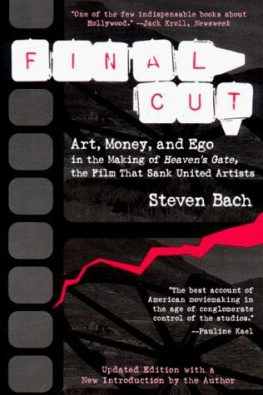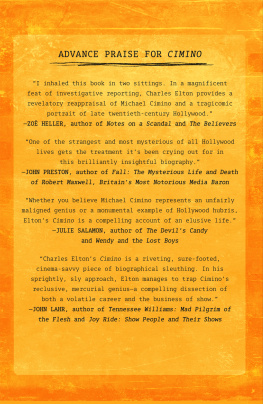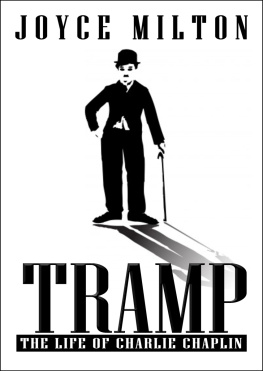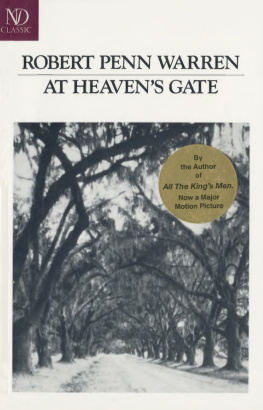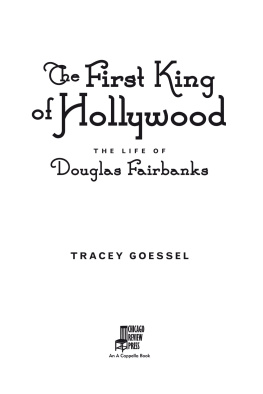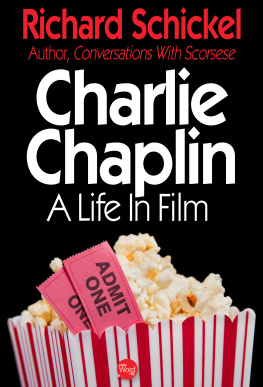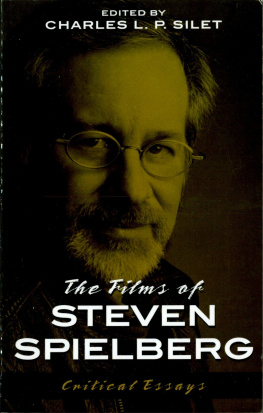This book is for my mother and father
AUTHOR'S FOREWORD
Orson Welles once observed that a poet needs a pen, a painter a brush, and a fjmmaker an army. This has never been more true (or more expensive) than it is today; nor has the military analogy ever been more apt. Wars, metaphorical and real, are hell we know, not only for the foot soldiers who slog through the trenches but also for the generals and chiefs of staff who get the glory or the sack.
Heavens Gate was a movie about a war and was one itself; it had many battlefields. One was literal, in Montana; another was economic, mainly in New York; some were political in both Hollywood and New York; and all of them were informed by personality.
More than a little havoc was wreaked, and more than a little rubble was left. Falling debris from the collapse of a once-great company dazed participants and onlookers alike, including many civilian bystanders, as unsure of what had happened as were those correspondents gamely sending confused dispatches back to the motion-picture and financial and, eventually, worldwide press.
Rebecca West once said she wrote to find out what she thought, and in some measure the pages that follow are my attempt to find out what sense I can draw from events that seemed as senseless at times to myself as they did to the press and the general public. As both participant and witness to the non-sense I do not shrink from the admission that 1 lobbed the occasional grenade into the chaos or participated in skirmishes hack on the home front that did nothing to improve conditions in the theater of war. It is hoped that the tone is less confessional" than frank and that the glimpses of life at staff headquarters and in the trenches may reveal, now that the smoke has cleared, what happened and how, and maybe even why.
These pages do not claim to be without personal viewpoint or to be exhaustive. There is another war story that might well be written about Heavens Gate by its chief general: that of the unwieldy war to create art from technology and ambition and will. Its a tough battle to try to touch the human spirit with money, machinery, and materiel. Victory or defeat in that war is in the eye or the heart of the beholder, and the reader as viewer can decide for himself.
In the meantime, however, here are the spent shell casings, the bombs exploded, the duds waiting or never to go off, the broad landscape of debris, the narrower one of souvenir, all collected by a once shell-shocked observer and participant after sifting through the rubble.
ACKNOWLEDGMENTS
When I first went to work for United Artists in May 1978, William Goldman urged me to keep a diary. I took his advice, and his appearance in those (and these) pages is therefore his own fault. Not so, many others.
I also kept daily business journals, notes on telephone calls, meetings, and other professional miscellany, usually in the sort of spiral-notebooks favored, appropriately enough, by students. The cost of my education was high and borne by many.
My two secretariesRica Joelson in the West and Anne Harkavy in the Eastdevotedly maintained calendars, travel itineraries, and records of phone calls made and received and saw to it that my personal files covering the events narrated in this book were as orderly and as complete as 1 would ever want them as memorabilia. I owe Anne and Rita much for their friendship and aid over the years, but for nothing so much as their having unw ittingly compiled the basic documentation on which this book is based.
I owe others, too. These pages could not have been written without the aid and support, both factual and friendly, of many who, like the author, were participants in or witnesses to the events here related. Some of them shared those years on condition they not be thanked by name, a condition I hereby acknowledge and respect. They know who they are and also, I hope, my gratitude to them. Others, whose names follow, were in varying ways helpful in clarifying issues, dates, moments, moods, and sometimes motives. They include from United Artists and the movie: Andreas Andy Albeck, Joann Carelli, Bart
Farher, Joseph Farrell, Robert French, Gene Goodman, Tom Gray, James Harvey, Allen Hightill, Lehman Katz, Derek Kavanagh, Roz Komack, Tambi Larsen, Nan Leonard, Charles Okun, Kathi Page, Gerald Paonessa, Richard Parks, Gary Schrager, Robert Schwartz, Hv Smith, Lois Smith, Dean Stolber, and Anthea Sylberr.
Others who were helpful include Tom Buckley, Les Gapay, Sabrina Grigorian, Leticia Kent, Paul Schumach, Fred Schuler, Syhelle Schuler, Gene Shalit, Kevin Thomas, Johannes Waltz, and Jim Watters, Special help and support came from Robert Doggett and James Kellerhals, and my gratitude and debt to them are great.
Conversations are re-created in this book, reconstructed from memory, both mine and others, and from the basic research materials already cited. In all but the obvious one or two I was either participant or witness.
There are two important omissions to the sources utilized, both major participants in the drama who chose nor to cooperate in its chronicling. David Field wrote me after long consideration that he did not want to read or even to he in the book. Michael Cimino was unresponsive to requests for interviews. Each of them would perhaps write a substantially different account from the one found here.
I also wish to thank the following people and organizations for their generous extensions of time and help: Dan Black and Frank Miele ot the Daily (Kalispell) InterLiike; William F. Conrod of the National Park Service; Mary Corliss of the Museum of Modern Art Film Library; Dick Harms of Michigan State University in East Lansing, Michigan; Kathleen Kimble of the (Montana) Missou/ian; Carmelita Pope ot the American Humane Association; Chief Martin Stefanic of the Kalispell, Montana, Police Department; and the sraffs of the following libraries: Amerika Haus in Munich; Margaret Herrick Library of the Academy of Motion Picture Arts and Sciences in Los Angeles; New York Public Library, particularly the Rare Books department; and the Osrer-reichisches Filmmuseum in Vienna.
At William Morrow 1 am indebted to Sherry Arden, Lisa Drew-, Laurie Lister, and Deborah Baker for their encouragement and attentiveness to this project. Robert J. Wunsch (without whom this hook would never have been written) not only led me to the typewriter, hut to my agent, Robert Lescher, who was both spiritual father to the book and to its author as well.
And finally, for the kind of support, encouragement, patience, and loyalty that go beyond definition and certainly beyond my ability to repay, two people who lived through these events in different ways and who shared the burdens and the occasional exultations: Maurice Pacini and Werner Rohr.
CHAPTER I
EPILOGUE: END CREDITS
Andy Albeck still grows Christmas trees on his farm in New Jersey and still sells them only to families with children. Christmas trees are for children, he maintains. He is working on two hooks, one for his grandchildren and one for the rest of us, and is successfully reconverting Manhattan brownstones back into one-family dwellings. His wife, Lotte, is still a broker.
With characteristic honesty and self-scrutiny he stated recently that the failure of Heaven's Gate was the failure of three people: David Field, Steven Bach, and Andy Albeck, and with characteristic generosity he still thinks of Michael Cimino as a remarkably talented man." Norbert Auerbach eventually resigned as copresident of UIP in London and recently appeared on Austrian television as one of the international set who live at least part time in Salzburg. He is reportedly preparing a picture to be produced in Paris.
Next page
